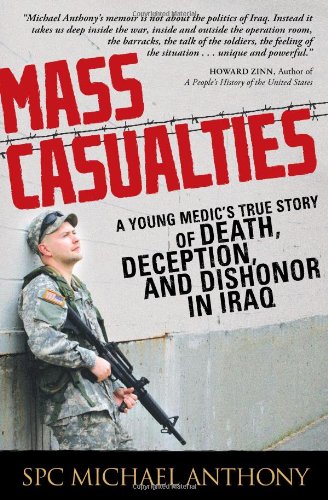- Date: 27.04.2011
- Book: Mass Casualties: A Young Medic's True Story of Death, Deception, and Dishonor in Iraq
- Author: plappen
Review
This is one person's chronicle of a year in Iraq as an Army medic. It is not a pretty picture.The hospital is set up in, supposedly safe, northern Iraq. It has 3 operating rooms, so if a large number of wounded are brought in at the same time, very unpleasant decisions would have to be made about who lives and who dies. Staff Sergeant Gagney, the immediate boss of the medics, is one of those who seems to think that leadership involves lots of yelling. He agonizes for hours over the work schedule, and comes up with a rotating schedule for everyone; first shift one day, then second shift the next day, then third shift the next day, etc. Of course, this totally disrupts everyone's sleep patterns, so that, after a couple of weeks, everyone comes to work looking like the walking dead. After a month, a female staff sergeant, Hudge, is given the responsibility of making a new schedule. In half an hour, she makes up a more rational schedule that gives everyone the same shift each day.
Later, when Hudge goes to Gagney to express her concerns about the way the unit is run, she is loudly accused of being the one with the emotional problem. When she visits the unit's Chaplain and mental Health Officer, Gagney had gotten to them first and told them about her supposedly unstable mental state. Another member of the unit attempts suicide. Instead of being sent home, or otherwise getting the help he needs, he is assigned extra duties, and basically told to suck it up. Another Sergeant shocks the unit by announcing that he is taking an emergency leave because his son has attempted suicide. Word filters back to the unit that he was seen in a local bar, back home, getting very friendly with a couple of prostitutes.
A Marine is brought in with a broken jaw, so he is in a lot of pain. The doctor on duty would rather attend a unit-wide awards ceremony than attend to the Marine. The author is not the only one in the unit who learns the value of Ambien and NyQuil (drunk by the bottle) for nights when sleep is impossible. Did I forget to mention the frequent shellings that send everyone running to the nearest bunker?
To call this a "wonderful" piece of writing might be the wrong word, because it gives many examples of human idiocy in a war zone, but it really is that good. By all means, read the "official" stories of American military personnel in Iraq, then read this to get the "real" story.
Recent actions
-
toryah1988 has added Harry Potter And The Order Of The Phoenix to their read list.
-
toryah1988 has added Harry Potter And The Goblet Of Fire to their read list.
-
toryah1988 has added Atonement to their read list.
-
toryah1988 has added New Moon (The Twilight Saga) to their read list.
-
Monica has added The Da Vinci Code (Large Print) to their wish list.
